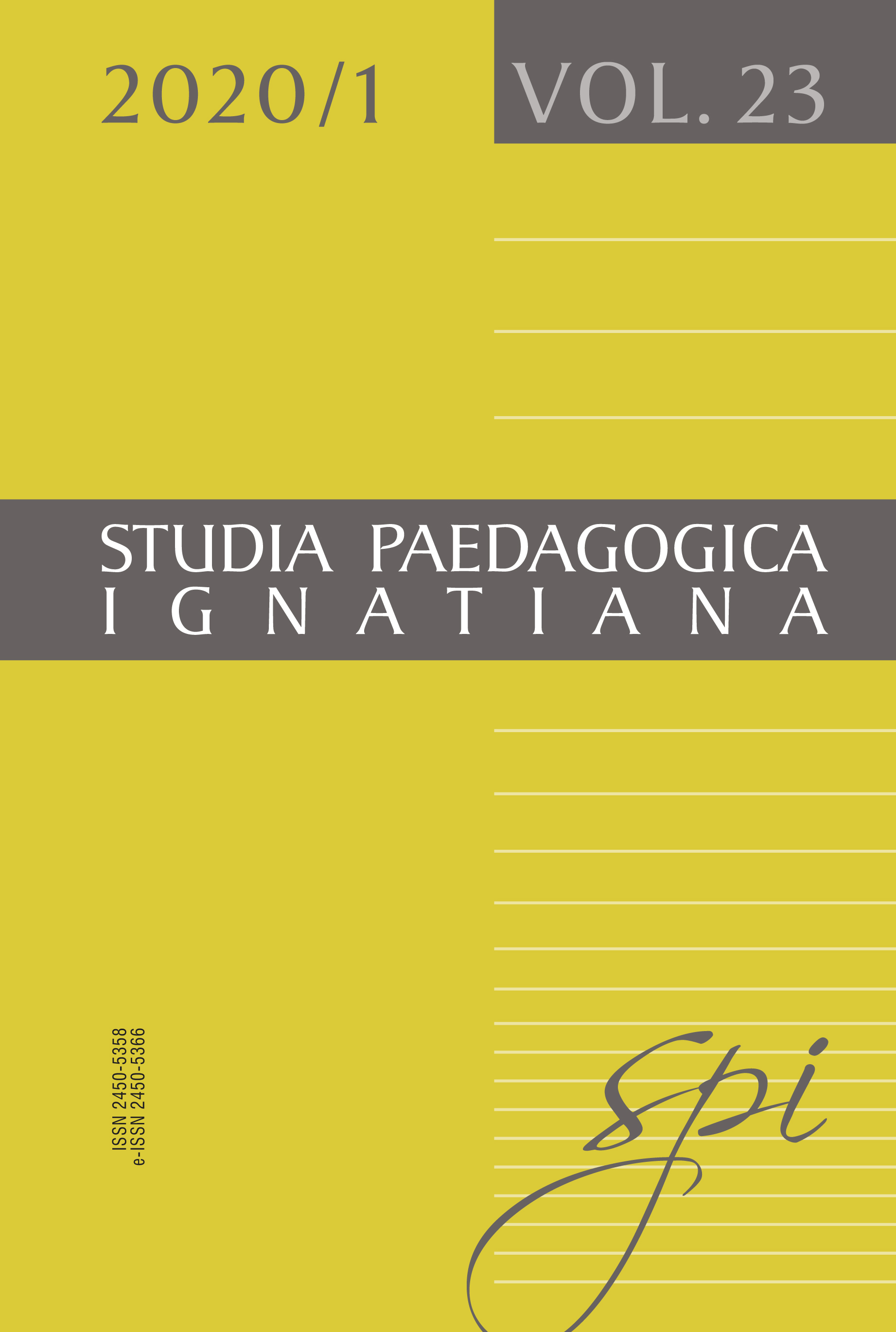Rozwój w świetle podstawowych kategorii myśli Johna Deweya
DOI:
https://doi.org/10.12775/SPI.2020.1.008Słowa kluczowe
John Dewey, instrumentalizm, rozwój, pragmatyzm, edukacja instrumentalistyczna, nawykAbstrakt
Rozwój jest bez wątpienia jednym z najważniejszych pojęć towarzyszących rozważaniom na temat kształcenia, wychowania, edukacji. Każdy pedagog musi na pewnym etapie swojej działalności skonfrontować się z tą wysoce podatną na interpretacje ideą. Nie uniknął tego również John Dewey, którego poglądy stały się przedmiotem analizy w niniejszym artykule. Celem tejże publikacji jest rekonstrukcja teorii rozwoju amerykańskiego pedagoga oraz krytyczna refleksja nad nią na podstawie jego prac oraz wybranych dzieł omawiających myśl pedagogiczną i filozoficzną pragmatysty. W poszczególnych częściach publikacji zostały zaprezentowane główne idee związane z koncepcją rozwoju Deweya, takie jak wartość instrumentalna, pojęcie nawyku czy demokracja. Przedstawione zagadnienia zostały poddane refleksji przez pryzmat ich implikacji pedagogicznych. Dokonana analiza przedmiotu badań ukazała możliwy kierunek rozwoju jednostek w myśli Deweya, jakim jest rozwój społeczeństwa. Nieunikniona wydaje się konieczność dalszych badań nad pedagogiką amerykańskiego filozofa, aby lepiej zrozumieć i zinterpretować jego idee czy też rozstrzygnąć niejasności, jakie występują w jego pismach.
Bibliografia
Bocheński J.M. (1994). Sto zabobonów. Krótki filozoficzny słownik zabobonów, Kraków: Philed.
Buczyńska-Garewicz H. (1970). Wartość i fakt. Rozważania o pragmatyzmie, Warszawa: PWN.
Copleston F. (2009). Historia filozofii. Od Benthama do Russella, t. 8, przeł. B. Chwedeńczuk, Warszawa: Instytut Wydawniczy Pax.
Dewey J. (1920). Reconstruction in Philosophy, New York: Henry Holt and Company.
Dewey J. (1922). Human Nature and Conduct: An Introduction to Social Psychology, New York: Henry Holt and Company.
Dewey J. (1963). Demokracja i wychowanie. Wstęp do filozofii wychowania, przeł. Z. Bastgen, Warszawa: Książka i Wiedza.
Dewey J. (1967). Wybór pism pedagogicznych, wybór i oprac. J. Pieter, Wrocław: Zakład Narodowy im. Ossolińskich.
Dewey J. (1988). Jak myślimy?, przeł. Z. Bastgenówna, Warszawa: PWN.
Dewey J. (2014). Doświadczenie i edukacja, przeł. E. Czujko-Moszyk, Warszawa: Warszawska Firma Wydawnicza.
Gałkowski S. (2003). Rozwój i odpowiedzialność. Antropologiczne podstawy koncepcji wychowania moralnego, Lublin: Wydawnictwo KUL.
Gutek G. (2003). Filozoficzne i ideologiczne podstawy edukacji, przeł. A. Kacmajor, A. Sulak, Gdańsk: Gdańskie Wydawnictwo Psychologiczne.
Gutowski P. (2002). Między monizmem a pluralizmem. Studium genezy i podstaw filozofii Johna Deweya, Lublin: Wydawnictwo KUL.
Koczanowicz L. (1994). Jednostka – działanie – społeczeństwo. Koncepcje jaźni w filozofii amerykańskiego pragmatyzmu, Warszawa: Instytut Filozofii i Socjologii PAN.
Miś A. (1998). Filozofia współczesna. Główne nurty, Warszawa: Wydawnictwo Naukowe Scholar.
Nysler Ł. (2007). Natura ludzka – jaźń – indywidualność. Filozoficzno-antropologiczne i etyczne podstawy koncepcji demokracji Johna Deweya, „Studia Philosophica Wratislaviensa”, t. 2, nr 1, s. 55–76.
Postman N. (2001). W stronę XVIII stulecia. Jak przeszłość może doskonalić naszą przyszłość, przeł. R. Frąc, Warszawa: Państwowy Instytut Wydawniczy.
Netografia
https://sjp.pwn.pl/slowniki/dojrzałość.html [dostęp: 10.12.2019].
Pobrania
Opublikowane
Jak cytować
Numer
Dział
Licencja
Autor zgłaszając swój artykuł oświadcza, że:
jest Autorem artykułu (zwanego dalej Utworem) i:
- przysługują mu wyłączne i nieograniczone prawa autorskie do Utworu,
- jest uprawniony/a do rozporządzania prawami autorskimi do Utworu.
Udziela Uniwersytetowi Ignatianum w Krakowie nieodpłatnej, niewyłącznej, nieograniczonej terytorialnie licencji do korzystania z Utworu na następujących polach eksploatacji:
- utrwalania utworu w formie papierowej, a także na nośniku cyfrowym lub magnetycznym;
- zwielokrotnienia utworu dowolną techniką, bez ograniczenia ilości wydań i liczby egzemplarzy;
- rozpowszechniania utworu i jego zwielokrotnionych egzemplarzy na jakimkolwiek nośniku, w tym wprowadzenia do obrotu, sprzedaży, użyczenia, najmu;
- wprowadzenia utworu do pamięci komputera;
- rozpowszechniania utworu w sieciach informatycznych, w tym w sieci Internet;
- publicznego wykonania, wystawienia, wyświetlenia, odtworzenia oraz nadawania i reemitowania, a także publicznego udostępniania utworu w taki sposób, aby każdy mógł mieć do niego dostęp w miejscu i czasie przez siebie wybranym;
- w zakresie praw zależnych do Utworu, obejmujących w szczególności prawo do dokonania koniecznych zmian w Utworze, wynikających z opracowania redakcyjnego i metodycznego, a także do dokonania tłumaczenia Utworu na języki obce.
Udzielenie licencji następuje z chwilą przekazania Utworu na rzecz Uniwersytetowi Ignatianum w Krakowie. Uniwersytet Ignatianum w Krakowie jest uprawniony do udzielania dalszych sublicencji do Utworu, w zakresie udzielonego prawa. Licencja jest ograniczona czasowo i zostaje udzielona na okres 15 lat, licząc od daty jej udzielenia.
Polityka prywatności
Statystyki
Liczba wyświetleń i pobrań: 4728
Liczba cytowań: 0



